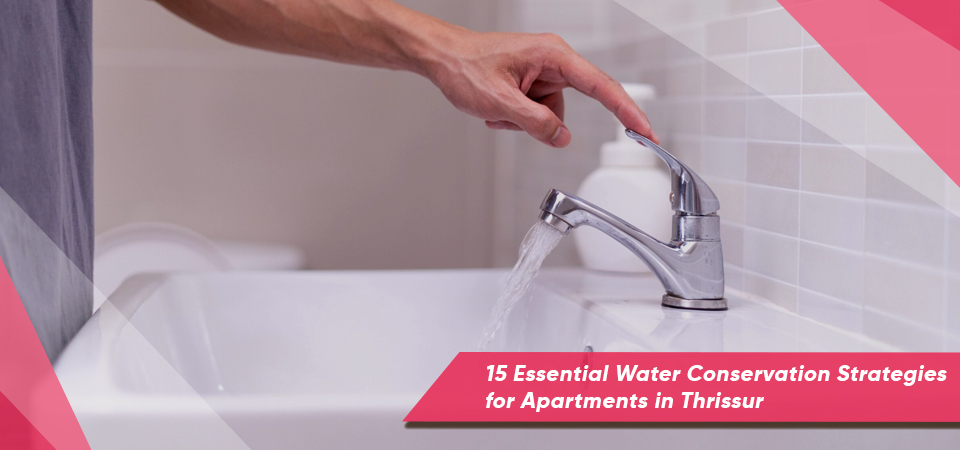In the heart of Kerala, Thrissur is not just known for its cultural festivities but also for its growing urban population and the escalating demand for sustainable living practices. As the real estate market trends in Thrissur evolve, the emphasis on eco-friendly and sustainable practices in apartment living has become paramount, particularly in the realm of water conservation. This blog post aims to shed light on 15 essential water conservation strategies that can be implemented in apartments to not only contribute to the environment but also ensure a sustainable future for the city.
Understanding the Need for Water Conservation in Thrissur
Thrissur’s tropical climate, coupled with its dense population, places a significant demand on its water resources. Urban areas, particularly apartments and residential complexes, are at the forefront of this challenge, making water conservation a necessity rather than a choice. The strategies outlined below are designed to help mitigate this demand and promote a culture of sustainability within apartment communities.
1. Rainwater Harvesting
Implementing rainwater harvesting systems can significantly reduce dependence on municipal water supplies. Apartments can collect rainwater from rooftops and use it for gardening, flushing toilets, and even cleaning purposes after proper treatment.
2. Low-Flow Plumbing Fixtures
Switching to low-flow toilets, showerheads, and faucets can drastically reduce water usage. These fixtures are designed to use significantly less water than conventional ones, contributing to considerable water savings over time.
3. Fixing Leaks Promptly
A small drip can waste a lot of water. Regular maintenance checks to identify and fix leaks not only save water but also prevent potential damage to the property, aligning with efficient apartment maintenance practices.
4. Water-Efficient Landscaping
Opt for drought-resistant plants and efficient irrigation methods like drip irrigation to minimize water use in landscaping. This approach not only conserves water but also reduces the need for maintenance.
5. Use of Greywater
Greywater recycling involves using wastewater from showers, sinks, and laundry for non-potable purposes. Setting up a greywater system can be a game-changer in reducing freshwater consumption.
6. Educating Residents on Water Conservation
Awareness and education are key. Organizing workshops and distributing materials on water-saving tips can empower residents to make informed decisions and adopt water-conserving habits.
7. Implementing Water Metering
Individual water meters encourage residents to be mindful of their water usage. Metering can significantly reduce water consumption by fostering a sense of accountability.
8. Timers for Watering Gardens
Installing timers for garden irrigation ensures that water is used judiciously, preventing overwatering and promoting efficient use of resources.
9. Using Energy-Efficient Appliances
Energy-efficient washing machines and dishwashers not only save electricity but also use less water, contributing to overall conservation efforts.
10. Regular Cleaning of Water Storage Tanks
Ensuring that water storage tanks are cleaned regularly prevents water wastage and maintains the quality of stored water, optimizing its use.
11. Promoting the Use of Buckets Over Showers for Bathing
Encouraging residents to opt for bucket baths can lead to significant water savings compared to showers, aligning with traditional water conservation practices.
12. Reuse of RO Water
The waste water from Reverse Osmosis (RO) units can be collected and reused for various household purposes, minimizing the overall water wastage.
13. Encouraging Car Wash Centers That Use Water-Efficient Techniques
Using commercial car wash centers that recycle water or use water-efficient methods can greatly reduce water consumption compared to washing cars with hoses.
14. Community Initiatives for Water Conservation
Engaging in community-driven water conservation projects can amplify the impact of individual efforts, setting a benchmark for sustainable living in Thrissur.
15. Leveraging Technology for Smart Water Management
Incorporating IoT sensors and automated irrigation systems can optimize water use, ensuring that water is used efficiently and responsibly.
Conclusion
Water conservation in apartments is not just about saving water; it’s about ensuring a sustainable future for Thrissur. By integrating these strategies into daily practices, apartment dwellers can play a crucial role in preserving this vital resource. As the real estate market trends in Thrissur continue to evolve, the emphasis on sustainable living and Easy Waste Management Solutions for Apartments becomes increasingly important. Together, we can make a difference, one drop at a time.

Leave a Reply